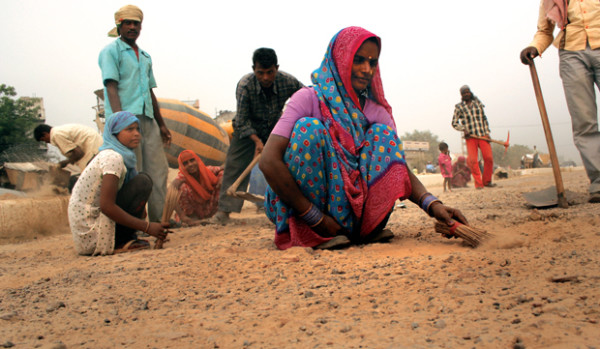A social audit conducted by a group of researchers and activists in 12 villages of six gram panchayats in Odisha exposed that as much as 49 percent of wages are siphoned off by officials and middlemen in the system.
Management of Information System (MIS) may be a necessary arrangement to bring transparency in the operation of MGNREGS, but not sufficient in checking corruption. A social audit conducted by a group of researchers and activists in 12 villages of six gram panchayats under Baipariguda and Dasmantpur blocks of Koraput district in Odisha exposed that as much as 49 percent of the wages are siphoned off by officials and middlemen in the system. The information provided in the electronic job cards of 410 households were verified with them by surveyors in the villages.
Of these households, sixty percent did not get a single day of work since January 2012 till February 2013. They were unaware about the demand driven character of the scheme. For the rest, Rs 4.55 lakh had been paid as wages as per records, but received only Rs 2.34 lakh. The average wage earned by labourers for work done since January 2012 is Rs 71 though the wage rate under MGNREGA is Rs 126. It was also found that there was a 12 percent hike in the number of days in job card than in realty.
In Tangniguda village of Paikphulebeda panchayat of Dasmantpur block, labourers said that they were asked to put their thumbprint on the withdrawal slip of the post office by the Gram Rozgar Sewak. They were told that would not get their rations if they did not do so.
“Delay in payment of wages has opened the door to corruption. Official payments take up to 3 months to process, so wages are advanced to labourers by functionaries of the implementing agency. When wages are sanctioned through official channels to their post office or bank accounts, these officials either go with labourers to withdraw wages and take the money from them or make them put their thumbprint on withdrawal slips,” explains Bidyut Mohanty of SPREAD, the NGO that spearheaded the survey.
There are also cases where postal accounts of dead persons are being operated by the implementers.
Accountability of the post office under MGNREGS is unclear. In a village in Kolar panchayat of Bapipariguda block, the Gaon Sathi allegedly has kept about 200 postal passbooks of people. This shows the quantum of embezzlement done in the scheme.
“Absence of effective mechanism of grievance redressal and non-initiation of prompt action on the corrupt are the reasons of continuity of corruption in MGNREGA in Odisha,” opines Dr Reetika Khera, Assistant Professor at IIT Delhi who was part of the survey.
SK Chakravarty, the Chief Post Master of Odisha with whom a report of the survey was shared says, “The postal department is accountable to the system of payment under MGNREGA. We will initiate an investigation and take appropriate action against the officials basing on veracity of allegations.” He was however non-committal on the timeline of action.
Aparajita Sarangi, Commissioner and Secretary at the Department of Panchayati Raj says, “I am yet to see the report; but I am sure the report will throw light on grey areas and raise several questions. After due investigation, I will fix the responsibility on the concerned officials of my department or postal department. As for transparency, we will begin fortnightly Rozgaar Divas where people will come in the village meetings and discuss on issues and concerns in implementation of MGNREGA.”
An autonomous social audit cell has been created by the Panchayati Raj department to conduct audits of work and improve the situation. This is a case where the government’s commitment to the programme will be put to test. Time will tell if the new models are reflection of commitment or mere eyewash!




Leave a reply